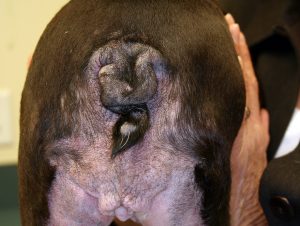Disease Spotlight: Fleabite Hypersensitivity
lay term: Flea Allergy
What causes it?
When a flea bites an animal, it injects a small amount of saliva into the skin. Many cats and dogs develop an allergy to a protein in the flea saliva. In these pets, small numbers of flea bites will lead to an intense allergic reaction and severe itching.
What signs do I look for?
Flea bite allergy tends to cause itching on the “back half” of the body, meaning the tail base, rump, belly, and rear legs. Other types of allergy, such as food allergy or environmental allergies, tend to cause itching on other parts of the body (such as the face, ears, paws, neck, armpits, or anus), but they don’t affect the back, so it’s pretty easy to differentiate flea bite allergy from the other allergies. Cats do not always present this way, but when the back half of the body is affected flea allergy must be ruled out before looking at other allergies.
Common owner reactions:
- “But I haven’t seen any fleas on my pet!” We know. We’re not suggesting that you’re a negligent pet owner or that your house is infested with fleas. Fleabite allergy is different from flea infestation, where a pet has numerous fleas living on them. With fleabite allergy, it only takes a very small amount of flea bites to set off the allergic reaction that can last for 3-4 weeks. A couple fleas biting your pet in the backyard when they go outside for bathroom breaks is enough to make an allergic dog extremely itchy for weeks. Most allergic pets are so sensitive to fleas that they’ll immediately bite off the flea before an owner ever gets the chance to notice it.
- “But I already use a monthly flea prevention!” We know. Many pets with fleabite allergy are already on a flea prevention. The problem is that many flea preventions do not work 100% all of the time. Allergic pets are bathed frequently, so topical medications like Frontline or Advantage can be washed off. Some products like Sentinel only sterilize female fleas and prevent eggs from hatching, but do not prevent fleas from biting them freely. Even oral products like Comfortis or Nexguard can lose strength after 21 days. We didn’t have a cold enough winter in north Texas to kill off flea populations, and we’ve had a large amount of spring rain, so this summer has been one of the worst years we’ve ever seen for fleabite allergy.
How is it Diagnosed?
It is possible to test for fleabite allergy, but not all flea-allergic pets will show a positive test reaction, because some flea-allergic pets have a delayed-type of allergic reaction that does not show up on traditional intradermal allergy testing. Because no other allergy causes itching on the “back half” of the body, often times a diagnosis of fleabite allergy can be made simply based on your pet’s pattern of itch.
What is the treatment?
The good news is that fleabite allergy has a very safe and effective treatment: stronger, more frequent flea prevention medications! The newer oral products all work very well in dogs to kill adult fleas quickly, which keeps the number of flea bites your pet receives to an absolute minimum. We recommend all cats and dogs in the household take a monthly oral flea prevention year-round (fleas are active even in the winter in Texas) to help protect your flea-allergic pet. In some cases, indoor and outdoor professional pest control services can be helpful. For the flea-allergic patient, it works best if products are given once every 3 weeks. Aggressive flea control will need to be in place for at least 3 months before you notice full improvement. During this time the flea life cycle will be impaired and your pet will be exposed to fewer flea bites. The outdoor environment is usually the source of re-infection: opossums, raccoons, outdoor cats, and other wild animals are the main source. Since the itch from a flea-flare can last 3-4 weeks, most pets need some temporary anti-itch medications like prednisone, Temaril-P, or Apoquel while recovering from the flare. Continuing with ultra-strict flea prevention for life can help reduce your pet’s need for steroids or Apoquel, which is definitely safer for their long-term health.
- Aug, 02, 2016
- Allergy News, Disease Spotlight



